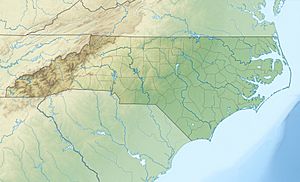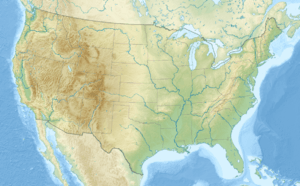Cedar Creek (Deep River tributary, Chatham) facts for kids
Quick facts for kids Cedar Creek |
|
|---|---|
|
Location of Cedar Creek mouth
|
|
| Other name(s) | Tributary to Deep River |
| Country | United States |
| State | North Carolina |
| County | Chatham County |
| Physical characteristics | |
| Main source | Bear Creek divide about 0.5 miles east of Goldston, North Carolina 390 ft (120 m) 35°35′48″N 079°18′18″W / 35.59667°N 79.30500°W |
| River mouth | Deep River about 1 mile east-northeast of Gulf, North Carolina 208 ft (63 m) 35°34′04″N 079°14′41″W / 35.56778°N 79.24472°W |
| Length | 5.41 mi (8.71 km) |
| Basin features | |
| Progression | generally southeast |
| River system | Deep River |
| Basin size | 13.19 square miles (34.2 km2) |
| Tributaries |
|
| Bridges | Henry Oldham Road, R Jordan Road |
Cedar Creek is a small but important waterway located in Chatham County, North Carolina. It flows for about 5.41 miles (8.71 kilometers). This creek is a "tributary," which means it's a smaller stream or river that flows into a larger one. Cedar Creek flows into the Deep River.
Contents
About Cedar Creek
Cedar Creek is known as a "3rd order tributary." This means it's not the smallest stream. Imagine tiny streams (1st order) flowing into slightly bigger streams (2nd order), and those then flowing into Cedar Creek (3rd order). This system helps carry water from a wide area into larger rivers.
Where Cedar Creek Flows
Cedar Creek begins its journey about 1 mile (1.6 kilometers) east of a town called Goldston, North Carolina. From there, it travels generally southeast. Its path takes it through the landscape of Chatham County. Finally, it joins the Deep River about 0.5 miles (0.8 kilometers) east-northeast of Gulf, North Carolina. Along its way, the creek flows under two bridges: Henry Oldham Road and R Jordan Road.
The Land Around the Creek
The area that Cedar Creek drains is called its "watershed." This is all the land where rain or snow eventually flows into the creek. Cedar Creek's watershed covers about 13.19 square miles (34.16 square kilometers). This area gets a good amount of rain each year, around 47.5 inches (120.65 centimeters).
A "wetness index" helps scientists understand how wet the land is. Cedar Creek's watershed has a wetness index of 435.12, which means it's quite a moist area. A large part of this watershed, about 66%, is covered by forests. These forests are very important. They help keep the water clean by filtering out pollutants. They also provide homes for many different plants and animals.
Why Creeks Like This Matter
Creeks and rivers, even small ones like Cedar Creek, are vital parts of our environment. They provide fresh water for wildlife and can be important for local ecosystems. They also play a role in the larger river systems, eventually contributing water to bigger rivers and even oceans. Protecting these natural waterways helps keep our environment healthy.
 | Roy Wilkins |
 | John Lewis |
 | Linda Carol Brown |



